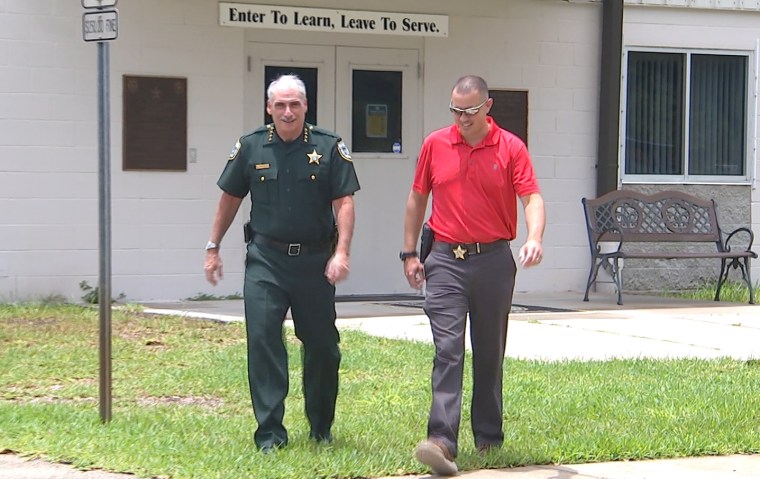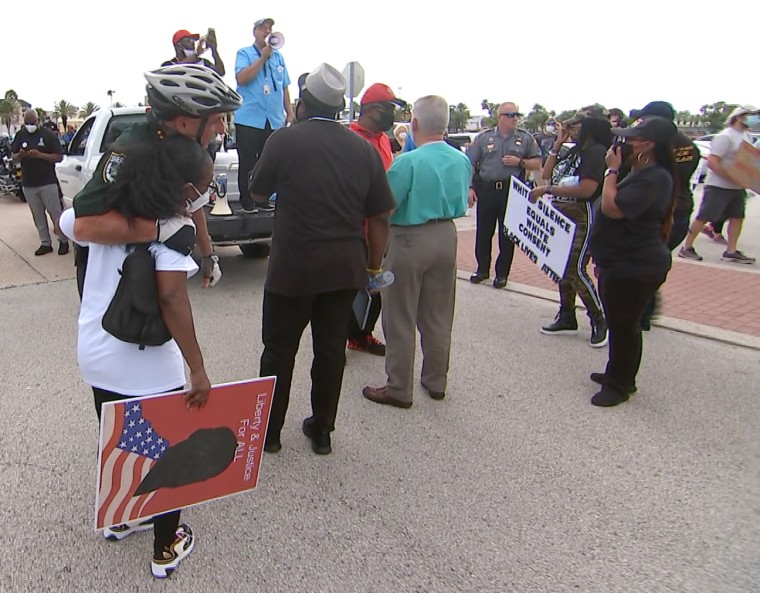"Put the baby down. Do it now," Sgt. Nick Shephard shouted at a distressed man who appeared on the video screen, holding a baby close to a freeway's ledge. Moments later, "the baby goes over the edge," he said afterward, "and we end up being forced to shoot."
He then adopted a different tactic, speaking gently to the same man as the video rolled again. "Absolutely, I care," he said. "Nothing more I care about right now than you, trust me." The man in the video, an avatar voiced by an actor, sobbed as he put the baby safely on the ground.
The two scenarios played out in a walk-in simulator in Volusia County, in east-central Florida, with video projected onto a curved wall, part of the training new recruits in the sheriff's department go through as they learn to defuse potentially violent confrontations.
"The greatest thing you can do is just talk to somebody," said Shephard, a supervisor in the county's child sex crimes unit who was demonstrating the virtual training exercise. "It teaches you that time is on your side. You know that you can slow things down."
Last year, when Shephard, then a patrolman, talked down an armed and suicidal man, he was given a departmental award not for bravery, but for his de-escalation technique.
Amid national protests against police violence following George Floyd's killing in Minneapolis and debates over the role of law enforcement in U.S. communities, the de-escalation training for deputies in Volusia County offers a potential model for changing policing.
Sheriff Mike Chitwood requires all new officers to take 40 hours of crisis intervention classes developed in consultation with the Police Executive Research Forum, a reform advocacy group. He said at a recent forum sponsored by the group that his goal is to reduce the "warrior mentality" he found in some officers when he arrived at the department in 2017. He said he was also inspired by a trip to Scotland in 2015 organized by the group, during which he learned new strategies to minimize violence.
"When you push the paradigm and look outside of your own way of training," he said, "it makes you say, 'Hmm, there's a better way to do these things.'"

Chitwood credits the de-escalation training with a decline in police use-of-force incidents in Volusia County. From 2017 to 2019, as the number of calls to authorities remained steady, annual arrests dropped by almost 30 percent, to 9,370, and the recorded frequency of Volusia deputies' using force fell by nearly half, from 122 annual incidents to 65.
The Police Executive Research Forum said about 80 departments across the country have adopted its de-escalation training. The group doesn't track whether use of force changed in those departments after the training.
In Volusia County, challenges remain. While African Americans make up about 11 percent of the population, they accounted for 22 percent to 24 percent of those arrested over the past three years, according to records provided by the sheriff's office, a gap that's in line with the national average. And more than a quarter of documented use-of-force incidents last year involved African Americans.
Since 1982, the county's deputies have shot and killed 25 people, two of them Black. The most recent shooting occurred last month, when Greg Howe, 37, a white Navy veteran, shot at several deputies after fleeing a traffic stop; deputies responded with an estimated 80 rounds, 14 of which struck Howe, killing him.
Chitwood, who previously was police chief of the county's largest city, Daytona Beach, said that while force can be necessary, he wants to ensure that officers slow down and calmly consider their options, particularly when responding to potentially troubled people.
"It's just as good police work to save a life as it is to get involved and stop a bad guy with a gun who's committing a massacre," he said. "It's the same thing."
Chitwood said he was influenced by the Scotland trip, arranged in 2015 by the Police Executive Research Forum's executive director, Chuck Wexler, a former Boston police hostage negotiator who advocates for reducing violence in U.S. policing.
Chitwood, along with nearly two dozen other U.S. law enforcement officials, spent several days outside Edinburgh at Tulliallan Castle, Police Scotland's training center and headquarters.
Scottish officers demonstrated nonconfrontational tactics; when a man threatened officers with a knife in one exercise, they kept him at a safe distance while talking to him until backup arrived. Then officers surrounded him with riot shields, without using firearms or stun guns.
The strategies are more common in Scotland, in part because gun violence is much less of a problem there than in the U.S.; Scotland banned civilian-owned handguns after 16 children and a teacher were killed in a school massacre in 1996. Far fewer Scottish officers carry guns — about 500 out of 17,000 officers — but they still must arrest people who may carry knives or other weapons.
"It was an epiphany to sit there and watch," Chitwood said. "They have to use their wits. They have to use their problem-solving abilities. You know, they have to call in the right group of people to defuse that situation."
Download the NBC News app for breaking news and alerts
Deputy Chief Constable Will Kerr, who oversees the Scottish training program, said he could count on one hand how many times police employees have fired their weapons and injured someone in recent years. The last time it happened was in March 2016.
"That cultural mindset establishes the approach that police officers take when they're engaging with members of the public," he said. "Even those who are violent, even those who are ostensibly posing a threat."
Chitwood said he had faced some opposition from the police union in Volusia County.
Brodie Hughes, president of the Volusia County Deputies Association, said that de-escalation techniques are sometimes appropriate and that they had already been in use before Chitwood arrived, but he said officers' safety must come first. Deputies last year shot and killed a carjacking suspect who opened fire on them; a bullet grazed a deputy's head.
"I think where the troops tend to not agree with that is when somebody's shooting at you and trying to take your life," he said. "That's a hard pill for people to swallow, to recognize that there's a place in law enforcement for both."
Black community leaders in the county said they appreciated Chitwood's efforts.
"He treats everybody equal and de-escalates things," said the Rev. Victor Gooden, senior pastor of New Life Church Ministries, who belongs to the Daytona Beach Black Clergy Alliance.
"I'm not saying we're a perfect police department," he added, "but they try to keep down all of the friction between the races, that I do know."
Cynthia Slater, president of the local NAACP chapter, said she has pressed the sheriff's office to require more comprehensive and frequent training in diversity, racial bias and cultural sensitivity. The department requires annual bias training, which she said is insufficient. "We don't want to have officers rolling up and placing people in cuffs before they understand the situation," she said.
But she said she'd developed a "really good partnership" with Chitwood, who attended a recent Black Lives Matter rally.

"Whenever there's a complaint from the community, we make sure that we get together, we talk about it, we try to come to an agreement as far as what happened, what didn't happen," she said. "I can describe him as honest."
A spokesman for the sheriff's office said its bias policy was "in the process of being updated" and would likely be expanded. He said the department will commit to increased training in racial bias.

